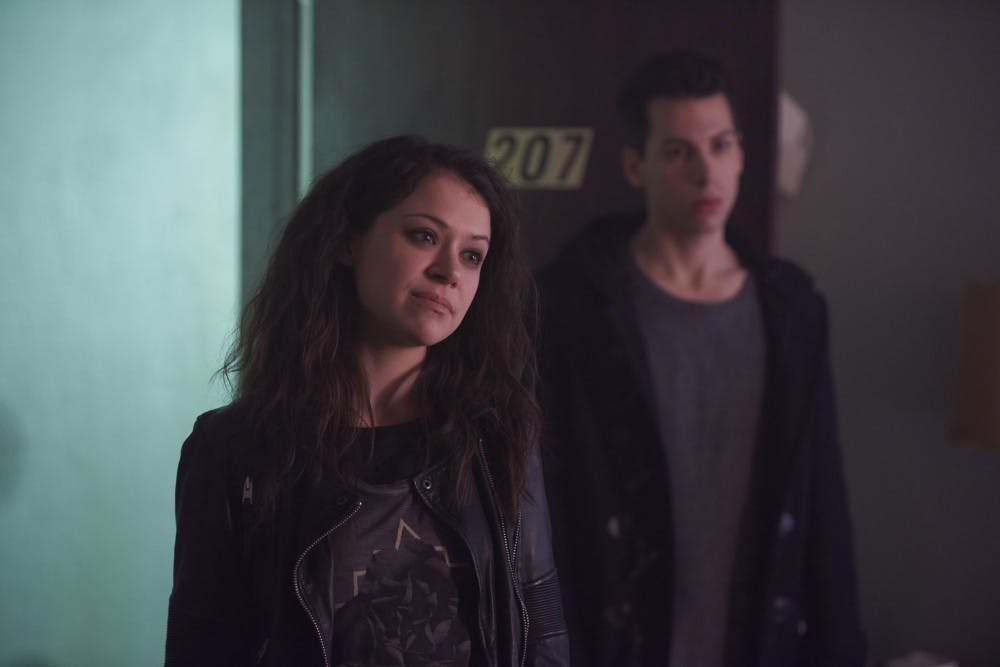Season four of “Orphan Black” opened with a back-to-the-future episode. After stepping in front of a train in the first episode and inducting protagonist Sarah Manning into the Clone Club postmortem, original clone cop Beth Childs is back.
The BBC America show has taken its viewers through three seasons of genetic shenanigans, beginning with Manning’s realization she is the product and property of a cloning experiment by the Dyad Institute.
It’s introduced us to the “sestras” of the female clone project, each one a brilliant argument for the power of nurture over nature, as well as several antagonistic factions with their own agendas for the Leda clones.
But in season four, the apparent focus on flashbacks gives the “Orphan Black” show a chance to rewrite it all.
Episode one of the new season focused on Beth’s life in the days before she commits suicide, giving literal everywoman Tatiana Maslany, who plays each of the Leda clones, a shot at filling in her life a little.
The episode also introduces an 11th clone — one who’s been around from the start and will, it seems, teach viewers how the past informs the present four seasons later.
Maslany told the Los Angeles Times one of the main themes in season four will be consent.
As the Neolutionist faction places worth in body modifications and evolution-via-surgery, the sense is the “consent” will be in context of physical violation, sexual or otherwise.
But one could easily argue that “consent” is a main theme of the show at large — with men in entirely supporting roles, “Orphan Black” can’t help its gendered take on social issues like bodily ownership, the nature of parenthood (voluntary or not) or identity as a social construct.
Nor should it. After four years, one thing is certain: the show is at its best when it focuses on these critical issues through the lens of sci-fi.
And as the bodies of the Leda clones are, to the geneticists, the prize to be won, pretty much all of Orphan Black is about consent, physical/sexual and otherwise.
Season 1 dealt with consent in the sense of agreement, and whether or not that agreement’s consequences are understood. At the outset of the series, the Leda project clones are all under the domain of Dyad or the Proletheans — in a very literal sense, as Cosima finds that each clone’s genetic marker and that of any children are property of Dyad, down to the cellular level.
Under these conditions, the various clones are approached with deals by Dyad to remove their human monitors in exchange for “voluntary” medical testing. Since Dyad has all of the leverage in any legal battles, soccer mom clone Alison Hendrix’s eventual agreement is baseless — as any reasonable person will know, coercion negates consent.
Much of season two dealt directly with women’s reproductive rights: as most of the clones looked further into the infertility experienced by everyone except the twins, Manning’s twin Helena is taken by the Proletheans, where she and another surrogate are forcibly impregnated.
Season 3 delved further into the mythology of the show with the introduction of the Castor clones, a male counterpart to the Leda project.
It’s also the first time in which rape is directly referenced. However, most of the season was a hodgepodge of revelations about the genetic origins of both projects, which alternately dragged and forced episodes to pack multiple twists into each episode.
In short, it was more boring than any show with this many gun-toting characters should be.
Maslany’s particular emphasis on physical consent this year could signal a darker tone for the new season or just a grosser one. The prominent emphasis on Beth supports the grimmer tone; after all, the audience already knows how her story ends.
There are some concerns to be had about the new season. With the introduction of new characters and more flashbacks than ever, it’s possible that the relatively streamlined narratives of seasons one and two could become cluttered with the same mythological constraints in season three.
The introduction of could help smooth the transition from past to present or screw it up further. There’s also the slight question of when “Orphan Black’s” showrunners decided that wavy hair and a stilted Germanic accent became shorthand for instability - but Maslany is hopefully good enough to make even that seem like a logical characterization choice.
“Orphan Black” is great at creating characters, but doesn’t always tie them together smoothly. The ability to go back and add context and nuance to early decisions that will affect the show’s present could help or harm the narrative.
But with the focus back on key sociological issues, as well as a return to the Clone Club’s roots, the coming season could also bring back what we loved about its first years.
Anne Halliwell
@Anne_Halliwell




